
48th Meeting of the Panel on Phytosanitary Measures
Malta, 2013-10-29/31
The Panel met in held in St Julians, Malta, on 2013-10-28/11-01. The main task of this Panel is to evaluate risks presented by specific  pests and design phytosanitary measures to avoid their introduction and spread.
pests and design phytosanitary measures to avoid their introduction and spread.
Participants
Courtesy: Angela Portelli
view more pictures ![]()
Emerging risks
The Panel discussed the situation of Xylella fastidiosa in Italy and suggested that a specific webpage should be prepared to raise awareness.
The Panel was also concerned by the spread of Agrilus planipennis within Russia. It considered that neighbouring countries (e.g. Ukraine, Belarus) should be alerted on this pest.
Horizontal issues
The Panel discussed the concept of ‘complete physical protection’ and its interpretation by exporting countries. It agreed that a document should be drafted to provide guidance on how to implement complete physical protection and define detailed requirements for specific pests.
The Panel discussed whether the requirements that an exporting country should certify that a consignment originate from a Pest-Free Area should be applied to all countries, including those from which a pest is not known to occur.
In relation with the new Standard PM 5/7 Screening process to identify priorities for commodity PRA for plants for planting, the need for a scheme for commodity PRA was discussed and the Panel concluded that it was not needed for the time being.
The Panel agreed that PM 3/60 Testing growing medium and plants in growing medium should be revised to make reference to the new standard PM 7/119 Standard on nematode extraction but suggested that it should be reconsidered to be included in PM 3/54 Growing plants in growing medium prior to export.
Pest Risk Analysis
The Panel finalized the Standard Decision-support scheme for prioritizing action during outbreaks by considering comments received during country consultation.
The Panel reviewed the first results of the study performed on pests associated with imports of tomato fruit and agreed on criteria to prioritize pests of potential concern for the EPPO region. The final outcome of the study will be discussed at the next Panel meeting.
The Panel also reviewed terms of reference for a study on non-processed wood commodities that should be conducted in 2014.
The Panel was presented 2 new EU funded project in which EPPO is a partner:
- DROPSA (Strategies to develop effective, innovative and practical approaches to protect major European fruit crops from pests and pathogens), a 4-year project which should start in 2014. One of the tasks is to produce an “alert list” of pests and pathogens likely to be introduced into Europe with fruit trade.
- TESTA, a 3-year project started in 2012: development of seed treatment methods, evidence for seed transmission and assessment of seed health.
EPPO lists of pests recommended for regulation
The Panel reviewed the PRAs prepared by the Expert Working Group on Polygraphus proximus, as well as the PRA on Acidovorax citrulli prepared in the framework of the EFSA-funded project Prima Phacie. It focused on the management options. The Panel also discussed the PRA on the invasive plant Parthenium hysterophorus.
The Panel reviewed 2 national PRAs:
- one prepared in Belgium on the nematode Scutellonema bradys. The Panel recommended that it should be added to the Alert List.
- one prepared in Czech Republic on Nematus lipovskyi. It will be further discussed at the next meeting.
The Panel will next meet on 2014-03-04/06 in Paris.
